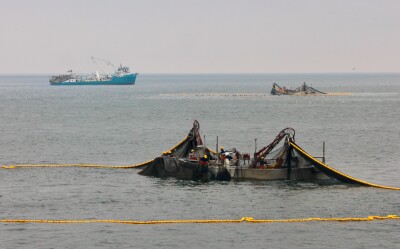Superstorm Sandy spared Maryland's Smith Island the heavy damage it flung on most of its neighbors, yet it still almost destroyed the historic commercial fishing community. That's because while 7,000 acres of tidal marshes, which are also home to abundant crab nurseries, kept the storm at bay, the federal government planned to use relief money as an opportunity to offer island residents cash in exchange for their property, as long as no one ever built on those abandoned parcels again.
Thanks to community organizing, Smith got lucky again. Though some residents were in favor of the government buyout, others opposed it. Wanting to protect their unique way of life, they formed Smith Island United and proposed government money instead be used to protect the island against erosion. It worked. Smith, home to about 250 people, is expected to receive $15 million in federal money toward building a new breakwater and jetty.
The story of Smith's near demise is told in "Come High Water: Sea Level Rise and Chesapeake Bay," a special report produced by Chesapeake Quarterly, published by the Maryland Sea Grant, and the Bay Journal newspaper. The articles, while short and focused, present a comprehensive yet easy-to-grasp assessment on the science behind rising sea levels as well as how the threat of rising seas is affecting low-lying communities on Chesapeake Bay.
Rising sea levels pose a threat to low-lying communities on Chesapeake Bay. YouTube screen shotAs explained in the report, rising sea levels are one of the consequences of global warming thanks to melting polar glaciers and the fact that warmer water takes up more space than cooler water (because of its chemistry). Added to this, the Mid-Atlantic coastline had already been sinking because of a phenomenon called "glacial forebulge." During the last ice age, the ice sheet's massive weight pressed down on the land beneath it so much that it caused the land outside the sheet (including the Mid-Atlantic coastline) to tilt upward, so that it rose like the opposite end of a downward seesaw. Scientists expect the Eastern shoreline to be hit especially hard, with sea levels rising 3 feet or more by the end of this century — the fastest rate in the United States.
One of the most interesting parts of the report is the skepticism in these communities about global warming. In the article, "Snapshots From the Edge," Bill Boicourt, an oceanographer at the University of Maryland's Center for Environmental Science in Cambridge, says he is often met with skepticism when talking about climate change to church groups and civic organizations. "They know what they are seeing, but many blame the problem on erosion, or 'tides.' Many don't want to talk about melting ice sheets or greenhouse gas emissions. They want to talk about fixes today that may help to get the water out of their yards, fixes such as the reconstruction of barrier islands in the Chesapeake Bay."
At first, it's hard to understand this skepticism. Why wouldn't people who can actually see their land sink into the ocean accept climate change as a real event? Why wouldn't they want to advocate for solutions that may slow down or halt the rising seas that may someday engulf their communities?
But then again, I see valid reasons for the denials. Even though rising sea levels are accelerating, the land has been sinking around here since Europeans first settled centuries ago. And messages about climate change have long been mixed, not just among politicians but also among scientists: For example, while they mostly agree that climate change is a real thing, there are differences of opinion on its outcomes, such as whether warming water is causing the Gulf Stream to slow down.
Going back to the story about Smith Island, I wonder if for some that skepticism/denial may be the best way to hang on. After all, erosion is a problem that can be dealt with at the local level. Stopping climate change requires global action that we have no control over. How do you argue in favor of preserving a way of life, if you're as good as doomed?







